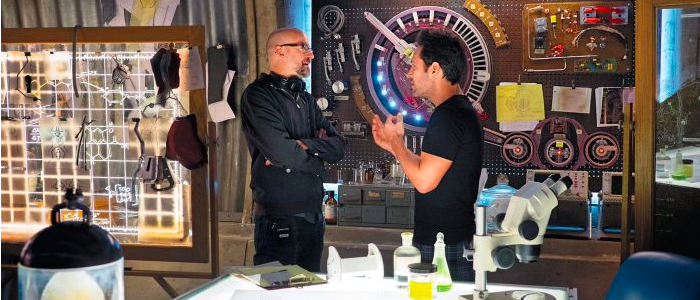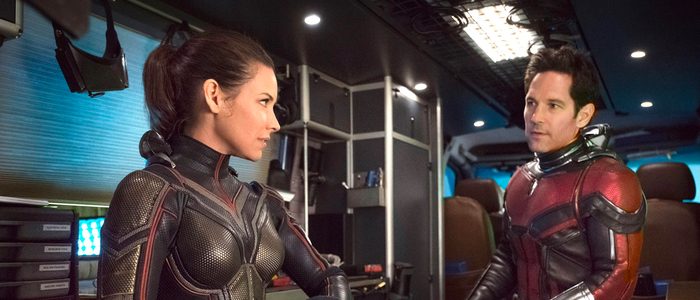‘Ant-Man and the Wasp’ Director Peyton Reed Discusses Notes From Kevin Feige and His Days Playing in a Smiths Cover Band [Interview]

Peyton Reed, the director of Down with Love and drummer of a long defunct Smiths cover band, once again brought some feel-good laughs to the Marvel Cinematic Universe with Ant-Man and the Wasp. The sequel was a bit bigger, a little looser, and even Scott Lang was funnier, but Reed and all involved still managed to keep it as contained and as cleanly told as the first movie. Reed’s Ant-Man still ain’t going big for the sake of going big.
Reed basically made what was a large-scale studio comedy with more emphasis on laughs than action. Ant-Man and the Wasp is a buddy comedy, not another save the world story. With smaller but more personal stakes, Reed delivered a sequel that does a lot more than check boxes. We recently had a brief conversation with the director about the sequel, mostly focused on his days in a Smiths cover band, notes from Marvel President Kevin Feige, working with Evangeline Lilly, and two of his past movies.
The Cure’s “Disintegration” was the first CD you bought, so that was a personal song you picked for the first movie. For Ant-Man and The Wasp, did you use any songs that are particularly meaningful to you?
Yeah, a couple. I mean, the whole idea of Luis’s grandma having a jukebox, and only played Morrissey stuff. That was another band, I was waiting to dismiss, I saw them early on and then so many years later, I’m a drummer and I played for a brief time in Smiths a cover band called, Louder than Bombs.
We played a handful of shows and the time we played at Spaceland in Silver Lake, when it was still Spaceland [now The Satellite], and some kid came up after the show and was like, “Aww man, you guys were really good, but have you heard this other Smiths cover band, Sweet and Tender Hooligan,” and I said no, and I’d never heard of them. And he said, “You should check them out.” I went and checked them out and, of course, they’re like an all Hispanic Smiths cover band and they had a massive following, and I think that was the first time I learned really about kind of the very specific following that he has in Los Angeles. So much so, that he moved from Manchester at some point to L.A., and started writing songs to those specific fans, and it seemed like a perfect bit of arcane knowledge and detail for Luis’s life.
So that’s definitely one. And then the inclusion of “Come On Get Happy,” the Partridge Family theme in the movie. As a kid that was a show that I grew up on, and just tonally we all liked it, and Rudd liked it, so that kinda became the Scott Lang sort of everything’s okay. If we did a montage through the beginning as he’s sort of marking time on house arrest, and then we reprise it at the end almost as sort of a mislead to what’s about to happen in the mid credit scene. So, yeah. Those two definitely have some personal connections for me.
That’s great. Do you still have any recordings of when you were in that Smiths cover band?
I think we do have some audio recordings, and I know there’s definitely some still photos of a show at Spaceland, and the reason … I mean, it was only a short term endeavor anyway. We were going to do a whole thing where for a couple months we’re gonna be a Smiths cover band, and the next couple months we were gonna be an R.E.M. cover band. We were gonna be really specific about cover band stuff. But then it all splitted, and we all got jobs and were working, so we never had time.
That sounds like it was a good time, though. With Ant-Man and the Wasp, how did your conversations with Evangeline Lilly on the first movie and leading up to the sequel influenced the Wasp?
I wanted to have her as involved as she was willing and able to be because I think she has a real personal investment in that character, and even as we were started to shape the story beats about what it could be, and hit upon this idea of starting it in The Wasp where they’re estranged as a result of the events in Civil War.
I wanted to run things past her at every stage of the game, and we had lots of conversations about once Hope Van Dyne gets the suit and becomes Wasp. Everything about her. What’s her attitude toward being a hero? And her physicality, and all those things. So I really welcomed Evangeline’s point-of-view because it was crucial. I mean, she was gonna be the person front and center playing that character, and for me it’s always good to involve those actors that you know are gonna be a part of the process. Involve them early on. One, because I think they just get more invested in the character, and two, you’re gonna have these conversations at some point, and you’d rather not be always on the day of shooting just trying to figure something out. So, her point-of-view was incredibly valuable. I would say crucial for me.

What’s a note from Kevin Feige usually look like?
I think they can kinda come in different forms. The notes are always very smart. Whether you agree or disagree with his notes, he comes from a really smart place, and they come from someone who has no desire to repeat themselves, and really his chief goal is to entertain and surprise an audience. So they can come in different forms, and really as we’re in the very beginning trying to formulate the story.
It can be things we talk about like, here’s a piece of imagery that as a fan could we get this, or what if this were the case? What if we know we want to progress the Scott, Cassie relationship? What if we start dropping hints about she really is her father’s daughter, and things like that. And that can be on the backend of things and very, very specific moments as we cut screens, and things about whether jokes are played or not, or conceptual things. And it’s miraculous that he’s able to do that in a way that never feels like annoying studio meddling. I think it’s just because we all come from a place of wanting these things to kind of … You know, Ant-Man and the Wasp is the twentieth MCU movie? So you really have to kind of pivot and try and mix things up.
You wanted Scott Lang to be funnier and less of the straight man role in the sequel. For Scott and the rest of the characters, do you know where you want to see their arcs end? Is it a trilogy in your mind?
I personally do have a trilogy arc in mind for them. Some of which I share with Marvel, and some of which I haven’t. But definitely where we kind of tool those characters in the second movie was very much in line with what I want to do, and I know specifics of Scott Lang was something that Paul and I talked a lot about is that in the first movie, particularly the first half of Ant-Man, he’s a little more laconic and straight forward, and a bit more straight man. And it was really kind establishing Paul Rudd as an action hero. That was something, and audiences had never seen him in that type of role. But the second time out we could have had the luxury of knowing that audiences have accepted that character. So we could really allow that character, Scott Lang, to be even funnier and take him in a direction where he’s sort of a step behind. He’s a little bit more of the … Big Lebowski-style. A little bit more Jeff Bridges.
Good comparison. I wanted to ask you about two of your earlier movies, Down with Love and Bring it On. For Down with Love, what was it like just having the opportunity to make a movie in that style?
I think for me the thing was that it was really the certain style exercise we were doing because it is a very heightened genre of filmmaking, and it was a very tactile style of filmmaking, and there were visual effects in the movie but they were mostly mats and lights and things like that, but I loved it just because it felt like the spirit in which we were making that movie really did mirror the spirit they would’ve made it in the early sixties. Nobody had trailers. We had dressing rooms. I have great memories of making that movie. I mean, it was a tough movie to make in the studio system because it’s a strange movie, but I’m very, very proud of that movie. I really am proud of that movie, and sometimes I look back on it on these years later and it feels like a miracle that it got made.
It’s a great movie. I remember how popular Bring it On was when it came out, but when did you first realize all the love people have for that movie? Was it evident right away?
I think it was later on. I know the opening night of that movie I remember really vividly because we were going out to audiences with a high school cheerleading comedy, and it really could have gone either way. And I just remember opening night being with Kirsten [Dunst] and [writer] Jessica Bendinger, and driving around the theaters, and seeing that people had actually showed up, and seeing that people seemed to be reacting. That’s the first sense I got that actually like wow, maybe this movie is gonna work for audiences. But in terms of the long term appeal of the movie, that’s certainly something I couldn’t have anticipated. I think every filmmaker hopes for that, but I like to think that it’s because hopefully we were maybe a little more forward-thinking about the attitudes in the movie and some of the subject matter that we go with, but you just never know. There’s no way to anticipate how a movie’s gonna connect with an audience.
***
Ant-Man and the Wasp is now available on Blu-ray.
The post ‘Ant-Man and the Wasp’ Director Peyton Reed Discusses Notes From Kevin Feige and His Days Playing in a Smiths Cover Band [Interview] appeared first on /Film.
from /Film https://ift.tt/2yKRdJI
![‘Ant-Man and the Wasp’ Director Peyton Reed Discusses Notes From Kevin Feige and His Days Playing in a Smiths Cover Band [Interview]](https://i.ytimg.com/vi/UUkn-enk2RU/default.jpg)
No comments: